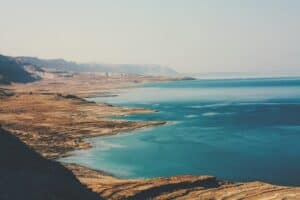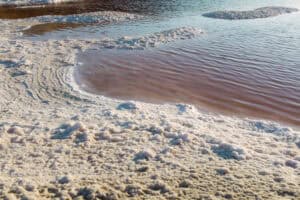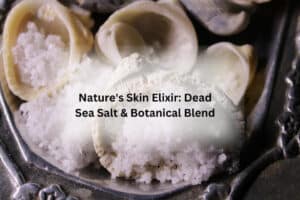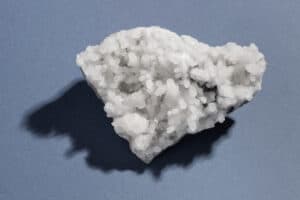The Dead Sea, a remarkable body of water located between Jordan and Israel, is renowned for its extreme salinity and its many health and beauty benefits.
The article will teach us the unique composition of the Dead Sea, exploring the astonishing salt levels that make it a true wonder of nature.
What Makes the Dead Sea So Salty?
The Dead Sea salt content is exceptionally high, making it one of the saltiest bodies of water on Earth. This remarkable salinity is primarily due to the fact that the Dead Sea has no outlet.
Water flows into the Dead Sea from the Jordan River and other sources, but it has no way to escape except through evaporation. As water evaporates, the minerals, including salts, become increasingly concentrated.
Over thousands of years, this process has resulted in the Dead Sea’s extraordinary salt levels.
The Unique Composition of Dead Sea Salt
The salt in the Dead Sea is unlike typical table salt (sodium chloride). It’s a combination of various salts and minerals, including magnesium, calcium, and potassium. The Dead Sea is particularly rich in magnesium, which has been associated with numerous health benefits. Let’s undersand what minerals are in dead sea salt:
-
Magnesium: Magnesium is one of the most abundant minerals in the Dead Sea. It is known for its various health and beauty benefits, including promoting skin health, relaxing muscles, and improving overall well being.
-
Calcium: Calcium is another essential mineral found in the Dead Sea. It is beneficial for bone health and may contribute to skin health as well.
-
Potassium: Potassium is a vital mineral for maintaining healthy bodily functions. It is also found in significant quantities in the Dead Sea.
-
Sodium: While sodium is present, the Dead Sea is not as high in sodium as some other bodies of water. The exceptional salinity of the Dead Sea is mainly due to the concentration of other minerals.
-
Bromine: The Dead Sea is one of the richest sources of bromine in the world. Bromine is used in various industrial applications and is also associated with potential therapeutic benefits.
-
Iodine: Iodine is present in trace amounts in the Dead Sea and has various health applications.
-
Sulfur: Sulfur is known for its therapeutic benefits and is often used in skincare products. The Dead Sea mud, which contains sulfur, is famous for its skin friendly properties.
-
Zinc: Zinc is found in the Dead Sea in trace amounts. It is an essential mineral for overall health.
-
Strontium: Strontium is another trace element found in the Dead Sea, and it has been associated with potential health benefits.
These minerals, in combination with the high salt content, contribute to the unique composition of the Dead Sea and are the reason behind its renowned therapeutic and cosmetic properties. Many individuals seek out products and experiences related to the Dead Sea to harness the potential health and beauty benefits of these minerals.
Beauty and Health Benefits
The high mineral content of Dead Sea salt has made it a sought after ingredient in the beauty and wellness industry. Here are some of the benefits associated with Dead Sea salt:
-
Skin Rejuvenation: Dead Sea salt is renowned for its skin friendly minerals. It’s often used in skincare products like scrubs and masks, believed to promote smooth, radiant skin.
-
Relief from Skin Conditions: Some individuals with skin conditions like psoriasis have reported relief from their symptoms after bathing in or applying Dead Sea salt products.
-
Muscle and Joint Relief: The minerals in Dead Sea salt, particularly magnesium, may help relieve muscle aches and joint discomfort when used in baths.
-
Improved Circulation: Bathing in Dead Sea salt is thought to enhance blood circulation, promoting overall health and vitality.
-
Stress Reduction: Soaking in a Dead Sea salt bath can be a relaxing experience, reducing stress and promoting a sense of well-being.
Tourism and the Dead Sea
The Dead Sea’s unique characteristics and renowned health benefits have made it a popular tourist destination. People from around the world visit the Dead Sea to float effortlessly in its super salty waters and take advantage of the therapeutic mud found along its shores. The experience of buoyancy in the Dead Sea is unlike any other, and tourists often revel in the sensation of effortlessly floating on the surface of the water.
Environmental Concerns
While the Dead Sea is a natural wonder, it faces significant environmental challenges. The sea’s water levels are decreasing at an alarming rate due to a combination of factors, including diversion of water from the Jordan River and mineral extraction activities. As water levels drop, the salt concentration increases, further impacting the delicate balance of this unique ecosystem.
Efforts are underway to address these concerns, such as the Red Sea-Dead Sea Conveyance project, which aims to stabilize water levels and maintain the Dead Sea’s ecological health. These initiatives are crucial for preserving the remarkable composition of the Dead Sea for future generations to appreciate.
Conclusion
The Dead Sea’s salt levels are a testament to the wonders of nature. Its unique composition, high mineral content, and renowned health and beauty benefits have made it a global treasure. However, it’s essential to understand the environmental challenges it faces and the importance of sustainable management to protect this extraordinary natural wonder.
The Dead Sea remarkable salinity and mineral rich waters continue to draw visitors and inspire awe. Whether you’re interested in its therapeutic benefits or the fascinating science behind its unique composition, the Dead Sea offers a deep dive into the wonders of our natural world.
Related content:
Relax and Rejuvenate with the 11 Best Natural Mineral Dead Sea Bath Salts
Creating the Perfect Bath: Blending Dead Sea Salt and Epsom Salt Tips







